2. American Civilians and Japanese Overlords!
2 comments
 The Solution to all our Problems
The Solution to all our Problems
Every bit you make yourself eliminates parasitic losses that strip your production from you and give it to your enemies that want to profit from sending you to war with other people that would also be better off making their own stuff instead of making profits for their enemies. Don't wage military war. Wage economic war. Don't conquer countries of other thralls to overlords. Conquer your home and free it from overlords. Don't fight your fellows. Fight your overlords and become free.
That's how we solve all the problems we face today. All our production is the fight to enslave us all to overlords, or the victory of economic freedom and prosperity. Every dime you send overlords is tribute. Stop paying to be conquered. Become free.

@valued-customer
Civilian of the New World While reading @valued-customer's articles, I always experience new shocks and surprises!😮
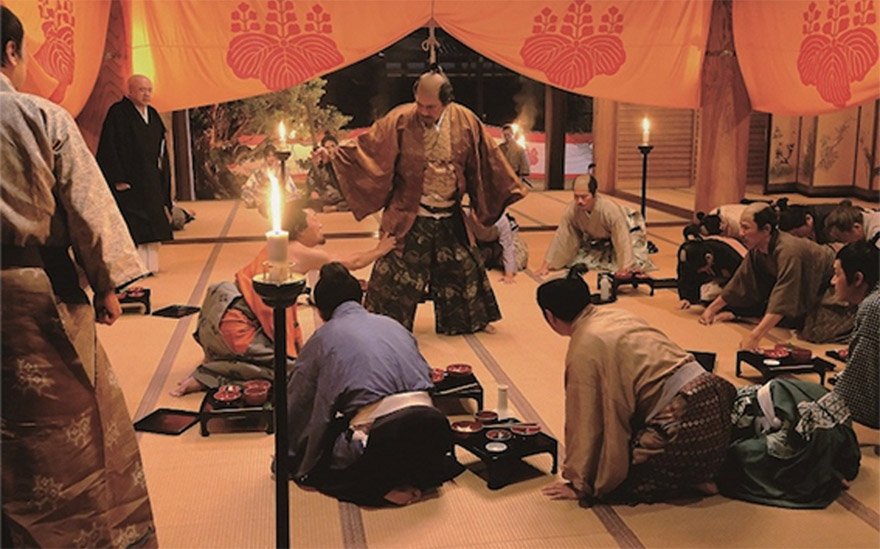
Janpanese overlords
I could understand why the Japanese overlords considered @valued-customer their most dangerous enemy!😆
I currently live as a servant to overlords.
I learned the history, philosophy, religion, science, politics, and economics of Western civilization from Japanese overlords.
So, I pride myself on knowing Japanese history, philosophy, religion, science, politics, and economics well!
Actually, my major is Chinese history!
I studied Chinese history with great interest, but I learned the history of Western civilization from Japanese overlords.
So, the American and European history I studied was mainly quoted from Japanese sources!
I wanted to tell my friends about it first.😃
1.American Civilians and Japanese Overlords!
1.Background of the birth of Japanese science!
In previous articles, I argued that the Japanese overlords wanted an alliance with their European overlords because they identified @valued-customer as their most fearsome enemy.
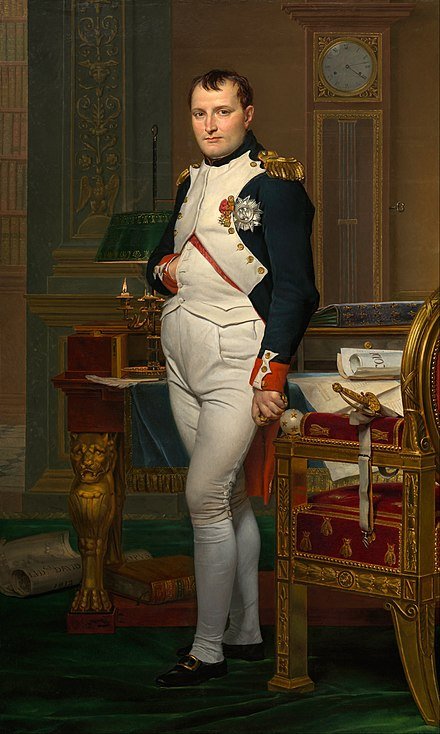 Napoleon Bonaparte
Napoleon Bonaparte
Napoleon Bonaparte (born Napoleone di Buonaparte;[1][b] 15 August 1769 – 5 May 1821), later known by his regnal name Napoleon I, was a French emperor and military commander who rose to prominence during the French Revolution and led successful campaigns during the Revolutionary Wars. He was the leader of the French Republic as First Consul from 1799 to 1804, then of the French Empire as Emperor of the French from 1804 until 1814, and briefly again in 1815. His political and cultural legacy endures as a celebrated and controversial leader. He initiated many enduring reforms, but has been criticized for his authoritarian rule. He is considered one of the greatest military commanders in history and his wars and campaigns are still studied at military schools worldwide. However, historians still debate whether he was responsible for the Napoleonic Wars in which between three and six million people died.
Japanese overlords came to respect Napoleon Bonaparte after seeing his life and achievements.
This is because Napoleon took advantage of the French Revolution to build the French Empire and was the first person to become emperor!
Their first hope was that they could defeat @valued-customer by imitating Napoleon's behavior.
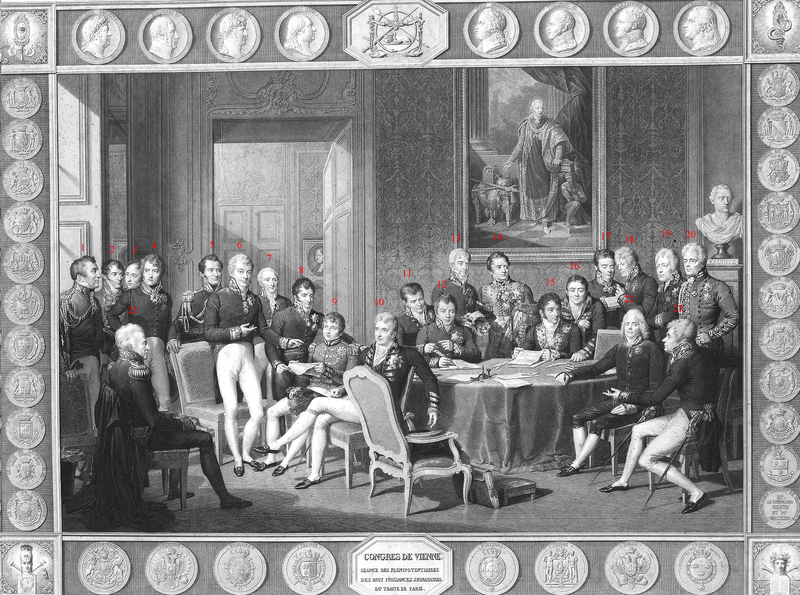 Delegates of the Congress of Vienna in a contemporary engraving by Jean Godefroy after the painting by Jean-Baptiste Isabey:
>The Congress of Vienna[a] of 1814–1815 was a series of international diplomatic meetings to discuss and agree upon a possible new layout of the European political and constitutional order after the downfall of the French Emperor Napoleon Bonaparte.[1] Participants were representatives of all European powers and other stakeholders. The Congress was chaired by Austrian statesman Klemens von Metternich, and was held in Vienna from September 1814 to June 1815.
Delegates of the Congress of Vienna in a contemporary engraving by Jean Godefroy after the painting by Jean-Baptiste Isabey:
>The Congress of Vienna[a] of 1814–1815 was a series of international diplomatic meetings to discuss and agree upon a possible new layout of the European political and constitutional order after the downfall of the French Emperor Napoleon Bonaparte.[1] Participants were representatives of all European powers and other stakeholders. The Congress was chaired by Austrian statesman Klemens von Metternich, and was held in Vienna from September 1814 to June 1815.
However, Napoleon's empire collapsed in just 10 years.
The Congress of Vienna was an international conference created by European overlords to suppress and subjugate Europe's @valued-customers.
Japanese overlords were impressed by the way their European overlords treated Europe's @valued-customers.
The Japanese overlords hoped that by imitating the ideas and actions of the European overlords, they would be able to defeat the @valued-customer of the New World!
Japanese overlords began to study the thoughts and actions of European overlords after Napoleon.
The causes of Napoleon's success and failure were of particular interest.
After Napoleon's fall, it was very impressive to see his legacies divided among European overlords.
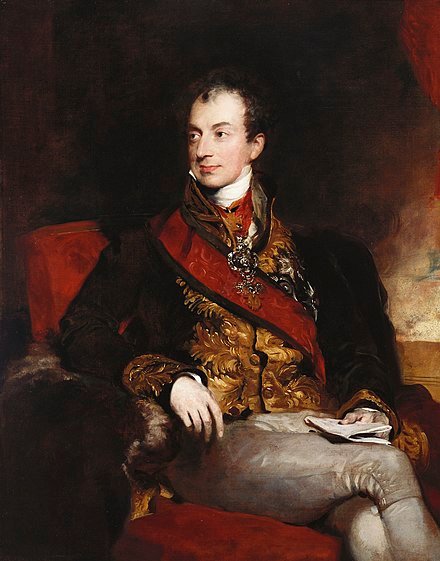 Klemens von Metternich
Klemens von Metternich
Klemens Wenzel Nepomuk Lothar, Prince of Metternich-Winneburg zu Beilstein[nb 1] (15 May 1773 – 11 June 1859),[1] known as Klemens von Metternich (German: [ˈkleːmens fɔn ˈmɛtɐniç]) or Prince Metternich, was a conservative Austrian statesman and diplomat who was at the center of the European balance of power known as the Concert of Europe for three decades as the Austrian Empire's foreign minister from 1809 and Chancellor from 1821 until the liberal Revolutions of 1848 forced his resignation.
Born into the House of Metternich in 1773 as the son of a diplomat, Metternich received a good education at the universities of Strasbourg and Mainz. Metternich rose through key diplomatic posts, including ambassadorial roles in the Kingdom of Saxony, the Kingdom of Prussia, and especially Napoleonic France. One of his first assignments as Foreign Minister was to engineer a détente with France that included the marriage of Napoleon to the Austrian archduchess Marie Louise. Soon after, he engineered Austria's entry into the War of the Sixth Coalition on the Allied side, signed the Treaty of Fontainebleau that sent Napoleon into exile and led the Austrian delegation at the Congress of Vienna that divided post-Napoleonic Europe amongst the major powers. For his service to the Austrian Empire, he was given the title of Prince in October 1813.
Under his guidance, the "Metternich system" of international congresses continued for another decade as Austria aligned itself with Russia and to a lesser extent Prussia. This marked the high point of Austria's diplomatic importance and thereafter Metternich slowly slipped into the periphery of international diplomacy. At home, Metternich held the post of Chancellor of State from 1821 until 1848 under both Francis I and his son Ferdinand I. After a brief exile in London, Brighton, and Brussels that lasted until 1851, he returned to the Viennese court, only this time to offer advice to Ferdinand's successor, Franz Josef. Having outlived his generation of politicians, Metternich died at the age of 86 in 1859.
A traditional conservative, Metternich was keen to maintain the balance of power, particularly by resisting Russian territorial ambitions in Central Europe and the Ottoman Empire. He disliked liberalism and strove to prevent the breakup of the Austrian Empire, for example, by crushing nationalist revolts in Austrian northern Italy. At home, he pursued a similar policy, using censorship and a wide-ranging spy network to suppress unrest.[2]
Metternich has been both praised and heavily criticized for the policies he pursued. His supporters pointed out that he presided over the "Austrian system" when international diplomacy helped prevent major wars in Europe. His qualities as a diplomat were commended, some noting that his achievements were considerable in light of the weakness of his negotiating position. Meanwhile, his detractors argued that he could have done much to secure Austria's future, and he was deemed a stumbling block to reforms in Austria. Metternich was also a supporter of the arts, taking a particular interest in music; he knew some of the most eminent composers in Europe at the time including Haydn, Beethoven, Rossini, Liszt, and Strauss.
The life and work of Klemens von Metternich made a great impression on the Japanese overlords.
Metternich was a role model for the politician and diplomat desired by Japan's overlords.
This is because Metternich was well aware of the causes of Napoleon's failure and downfall.
The Japanese overlords recognized Metternich's achievement of achieving peace in Europe for 30 years by preventing confrontations and wars among Great Britain, France, Prussia, Austria, Russia, and the Ottomans.
The Japanese overlords assessed that Metternich had done well to prevent @valued-customer's resistance and rebellion.
Japan's overlords thought that Metternich had tamed the @valued-customer through censorship, repression, and bribery!
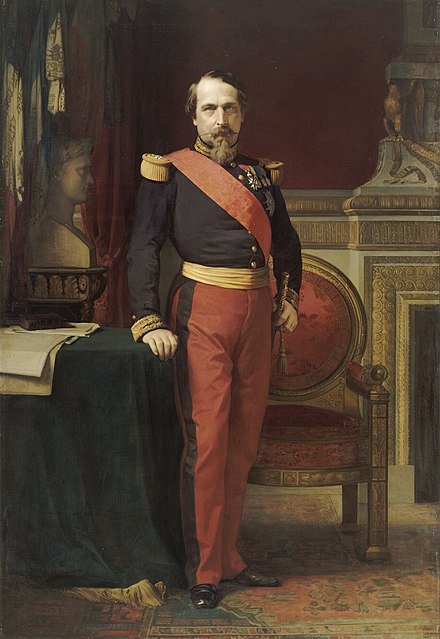 Napoleon III
Napoleon III
Napoleon III (Charles-Louis Napoléon Bonaparte; 20 April 1808 – 9 January 1873) was the first president of France from 1848 to 1852, and the last monarch of France as Emperor of the French from 1852 until he was deposed in absentia on 4 September 1870.
Prior to his reign, Napoleon III was known as Louis Napoleon Bonaparte. He was born in Paris as the son of Louis Bonaparte, King of Holland (1806–1810), and his wife, Hortense de Beauharnais. Napoleon I was Louis Napoleon's paternal uncle, and one of his cousins was the disputed Napoleon II. Louis Napoleon was the first and only president of the French Second Republic, elected in 1848. He seized power by force in 1851 when he could not constitutionally be reelected. He later proclaimed himself Emperor of the French and founded the Second Empire, reigning until the defeat of the French Army and his capture by Prussia and its allies at the Battle of Sedan in 1870.
Napoleon III was a popular monarch who oversaw the modernization of the French economy and filled Paris with new boulevards and parks. He expanded the French colonial empire, made the French merchant navy the second largest in the world, and personally engaged in two wars. Maintaining leadership for 22 years, he was the longest-reigning leader of France since the fall of the Ancien Régime, although his reign would ultimately end on the battlefield.
Napoleon III commissioned a grand reconstruction of Paris carried out by prefect of the Seine, Baron Georges-Eugène Haussmann. He expanded and consolidated the railway system throughout the nation and modernized the banking system. Napoleon promoted the building of the Suez Canal and established modern agriculture, which ended famines in France and made the country an agricultural exporter. He negotiated the 1860 Cobden–Chevalier Free Trade Agreement with Britain and similar agreements with France's other European trading partners. Social reforms included giving French workers the right to strike, the right to organize, and the right for women to be admitted to a French university.
In foreign policy, Napoleon III aimed to reassert French influence in Europe and around the world. In Europe, he allied with Britain and defeated Russia in the Crimean War (1853–1856). His regime assisted Italian unification by defeating the Austrian Empire in the Second Italian War of Independence and later annexed Savoy and Nice through the Treaty of Turin as its deferred reward. At the same time, his forces defended the Papal States against annexation by Italy. He was also favourable towards the 1859 union of the Danubian Principalities, which resulted in the establishment of the United Principalities of Moldavia and Wallachia. Napoleon doubled the area of the French colonial empire with expansions in Asia, the Pacific, and Africa. On the other hand, the intervention in Mexico, which aimed to create a Second Mexican Empire under French protection, ended in total failure.
From 1866, Napoleon had to face the mounting power of Prussia as its minister president Otto von Bismarck sought German unification under Prussian leadership. In July 1870, Napoleon reluctantly declared war on Prussia after pressure from the general public. The French Army was rapidly defeated, and Napoleon was captured at Sedan. He was swiftly dethroned and the Third Republic was proclaimed in Paris. After he was released from German custody, he went into exile in England, where he died in 1873.
The rise of Napoleon III collapsed Metternich's dreams.
Taking advantage of the French people's ambition to envy Napoleon I's empire, Napoleon III started the Crimean War .
He formed an alliance with Great Britain, founded the Second French Empire, and collapsed the Austrian Empire.
Because of the war started by Napoleon III, Europe became a sea of fire as revolutionary wars of liberals broke out again.
Napoleon III's populist policy of increasing French pride through wars of overseas conquest became a decisive starting point for civilians across Europe to demand more freedom and bread from their overlords.
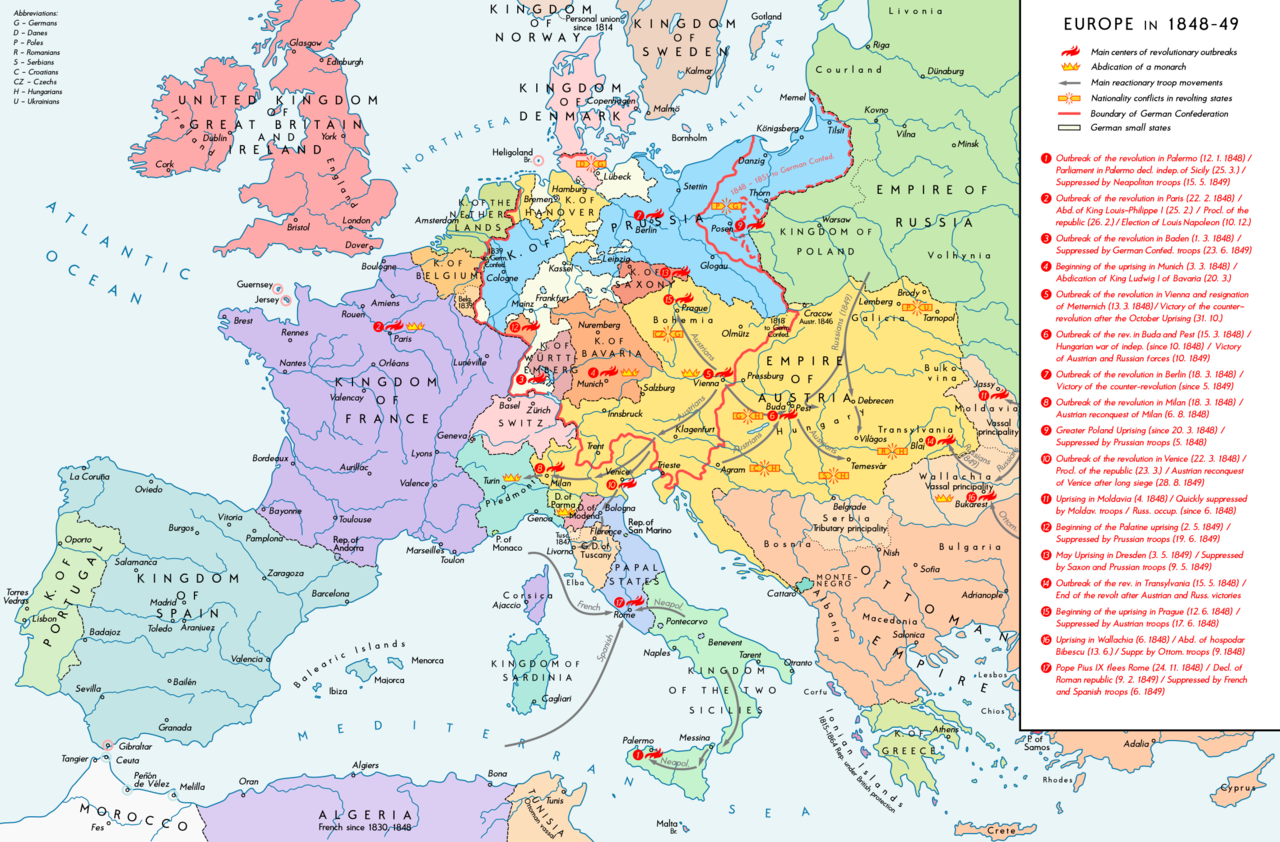 Map of Europe in 1848–1849 depicting the main revolutionary centers, important counter-revolutionary troop movements and states with abdications
Map of Europe in 1848–1849 depicting the main revolutionary centers, important counter-revolutionary troop movements and states with abdications
The revolutions of 1848, known in some countries as the Springtime of the Peoples[2] or the Springtime of Nations, were a series of revolutions throughout Europe over the course of more than one year, from 1848 to 1849. It remains the most widespread revolutionary wave in European history to date.[citation needed]
The revolutions were essentially democratic and liberal in nature, with the aim of removing the old monarchical structures and creating independent nation-states, as envisioned by romantic nationalism. The revolutions spread across Europe after an initial revolution began in Italy in January 1848.[3][4] Over 50 countries were affected, but with no significant coordination or cooperation among their respective revolutionaries. Some of the major contributing factors were widespread dissatisfaction with political leadership, demands for more participation in government and democracy, demands for freedom of the press, other demands made by the working class for economic rights, the upsurge of nationalism,[5] and the European potato failure, which triggered mass starvation, migration, and civil unrest.[6]
The uprisings were led by temporary coalitions of reformers, the middle classes, the upper classes (the bourgeoisie) and workers;[7] however, the coalitions did not hold together for long. Many of the revolutions were quickly suppressed, as tens of thousands of people were killed, and even more were forced into exile. Significant lasting reforms included the abolition of serfdom in Austria and Hungary, the end of absolute monarchy in Denmark, and the introduction of representative democracy in the Netherlands. The revolutions were most important in France, the Netherlands, Italy, the Austrian Empire, and the states of the German Confederation that would make up the German Empire in the late 19th and early 20th centuries. The wave of uprisings ended in October 1849.
As European civilians again waged revolutionary wars against their overlords, the authority and power of Europe's emperors and kings were challenged.
The revolutions of 1848, which erupted throughout Europe, were led by liberals, socialists, and republicans, but failed because they did not receive support from workers and peasants.
However, through the revolutions of 1848, some successes were achieved when European overlords made compromises with civilians and opened parliaments.
Japan's overlords were interested in why democratic revolutions in Europe were largely unsuccessful, unlike those in the United States.
They finally found a Prussian who was very effective in governing the democratic revolutions taking place on the European continent.
He was the first to create State Socialism (German: Staatssozialismus) , which my esteemed senior @valued-customer calls a corrupt policy.😆
But, The Prussian is still respected by the overlords of East Asia, including Japan!
State Socialism (German: Staatssozialismus) was a set of social programs implemented in the German Empire that were initiated by Otto von Bismarck in 1883 as remedial measures to appease the working class and detract support for socialism and the Social Democratic Party of Germany following earlier attempts to achieve the same objective through Bismarck's Anti-Socialist Laws.[1][2] As a term, it was coined by Bismarck's liberal opposition to these social welfare policies, but it was later accepted by Bismarck.[3][4] This did not prevent the Social Democrats from becoming the biggest party in the Reichstag by 1912. According to historian Jonathan Steinberg, "[a]ll told, Bismarck's system was a massive success—except in one respect. His goal to keep the Social Democratic Party out of power utterly failed. The vote for the Social Democratic Party went up and by 1912 they were the biggest party in the Reichstag".[5]
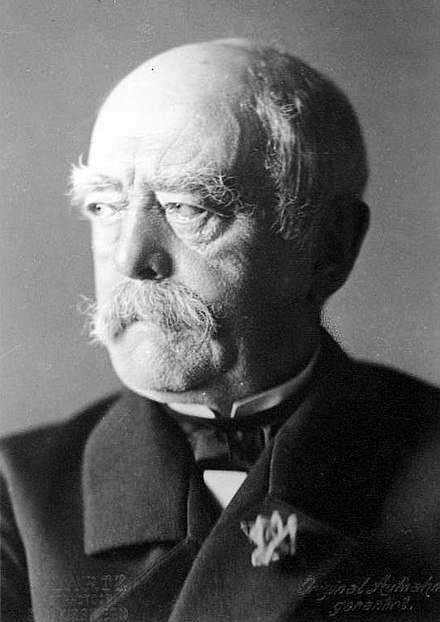 Otto von Bismarck
> Otto, Prince of Bismarck, Count of Bismarck-Schönhausen, Duke of Lauenburg (German: Otto, Fürst von Bismarck, Graf von Bismarck-Schönhausen, Herzog zu Lauenburg, pronounced [ˈɔtoː fɔn ˈbɪsmaʁk] ⓘ; 1 April 1815 – 30 July 1898; born Otto Eduard Leopold von Bismarck) was a Prussian and later German statesman and diplomat.
Otto von Bismarck
> Otto, Prince of Bismarck, Count of Bismarck-Schönhausen, Duke of Lauenburg (German: Otto, Fürst von Bismarck, Graf von Bismarck-Schönhausen, Herzog zu Lauenburg, pronounced [ˈɔtoː fɔn ˈbɪsmaʁk] ⓘ; 1 April 1815 – 30 July 1898; born Otto Eduard Leopold von Bismarck) was a Prussian and later German statesman and diplomat.
From his origins in the upper class of Junker landowners, Bismarck rose rapidly in Prussian politics, and from 1862 to 1890 he was the minister president and foreign minister of Prussia. Before that, he was the Prussian ambassador to Russia and France and served in both houses of the Prussian parliament. He masterminded the unification of Germany in 1871 and served as the first chancellor of the German Empire until 1890, in which capacity he dominated European affairs. He had served as chancellor of the North German Confederation from 1867 to 1871, alongside his responsibilities in the Kingdom of Prussia. He worked with King Wilhelm I of Prussia to unify the various German states. The king granted Bismarck the titles of Count of Bismarck-Schönhausen in 1865 and Prince of Bismarck in 1871. Bismarck provoked three short, decisive wars against Denmark, Austria, and France. Following the defeat of Austria, he replaced the German Confederation with the North German Confederation, aligning the smaller North German states with Prussia, but excluding Austria. Receiving the support of the independent South German states in Prussia's defeat of France, he formed the German Empire – which also excluded Austria – and united Germany. With Prussian dominance accomplished by 1871, Bismarck used balance of power diplomacy to maintain Germany's position in a peaceful Europe. However, the annexation of Alsace–Lorraine caused French revanchism and Germanophobia. Bismarck's Realpolitik and powerful rule at home led to him being called the Iron Chancellor. Juggling a very complex interlocking series of conferences, negotiations and alliances, he used his diplomatic skills to maintain Germany's position. Bismarck disliked colonialism because he thought it would consume German resources rather than reaping the benefit of it but reluctantly built an overseas empire when it was demanded by both elite and mass opinion.
As part of his domestic political maneuvering, Bismarck created the first welfare state in the modern world, with the goal of undermining his socialist opponents. In the 1870s, he allied himself with the low-tariff, anti-Catholic Liberals and fought the Catholic Church in what was called the Kulturkampf ("culture struggle"). This failed, as the Catholics responded by forming the powerful German Centre Party and using universal male suffrage to gain a bloc of seats. Bismarck responded by ending the Kulturkampf, breaking with the Liberals, and forming a political alliance with the Centre Party to fight the Socialists. He was loyal to his ruler, German Emperor Wilhelm I, who argued with Bismarck but supported him against the advice of Wilhelm's wife and son. While the Imperial Reichstag was elected by universal male suffrage, it did not have control of government policy. Bismarck distrusted democracy and ruled through a strong, well-trained bureaucracy with power in the hands of a traditional Junker elite. In 1888, which came to be known as the Year of the Three Emperors, the German throne passed from Wilhelm I to Friedrich III to Wilhelm II. The new emperor dismissed Bismarck from office two years later, and Bismarck retired to write his memoirs.
Bismarck is best remembered for his role in German unification. As head of Prussia and later Germany, Bismarck possessed not only a long-term national and international vision but also the short-term ability to juggle complex developments. As a result, he became a hero to German nationalists, who built many monuments honouring him. Historians praise him as a visionary who was instrumental in uniting Germany and kept the peace in Europe through adroit diplomacy. He has been criticized for his domestic policies such as Catholic persecution and the centralization of executive power, which some describe as Caesarist. Furthermore, he has been criticized by opponents of German nationalism, as nationalism became engrained in German culture, galvanizing the country to aggressively pursue nationalistic policies in both World Wars.
Napoleon III falls when he is defeated by a greater and more outstanding opponent.
Otto von Bismarck was the greatest European overlord since Napoleon I.
Bismarck knew very well Napoleon III's weaknesses and limitations.
He thought Napoleon III was a clown imitating the glory of Napoleon I.
He thought that the wars and revolutions waged by the French Second Empire were festivals that satisfied the vanity of the French people.
He believed that Prussia could seize European hegemony by taking advantage of the war between France, Austria, Russia, and Britain for European hegemony.
He succeeded in building the Second German Empire by taking advantage of the wars of European countries to defeat Austria and France.
He was able to achieve remarkable success because he understood the causes of Napoleon I's success and failure better than anyone else.
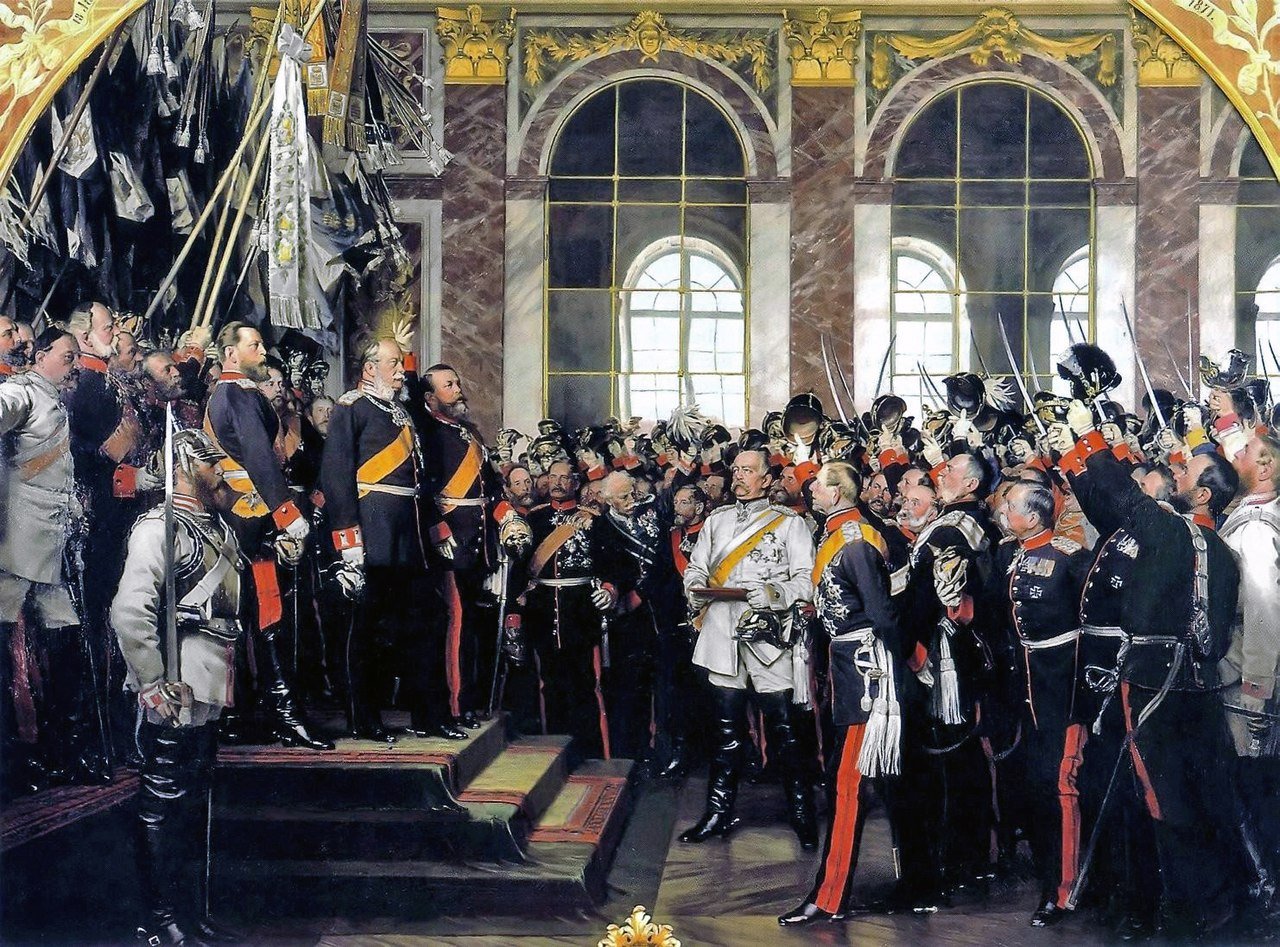 Proclamation of the German Empire
Proclamation of the German Empire
The proclamation of the German Empire, also known as the Deutsche Reichsgründung, took place in January 1871 after the joint victory of the German states in the Franco-Prussian War. As a result of the November Treaties of 1870, the southern German states of Baden, Hesse-Darmstadt, with their territories south of the Main line, Württemberg and Bavaria, joined the Prussian-dominated "North German Confederation" on 1 January 1871.[1] On the same day, the new Constitution of the German Confederation came into force, thereby significantly extending the federal German lands to the newly created German Empire.[2][3][4] The Day of the founding of the German Empire, January 18, became a day of celebration, marking when the Prussian King William I was proclaimed German Emperor at the Palace of Versailles.
The Japanese overlords concluded that Bismarck's remarkable success was due to the fact that he ruled the German Empire according to socialist policies.
Japan's overlords were convinced that American capitalism and republicanism would collapse Japan and eventually turn it into an American colony.
After Bismarck the German state degraded through pernicious socialism that crept ever more intrusively into public and private affairs. I predict it will vanish completely, and I am certain that these ever more centralizing programs - and the pogroms they cause - will decline as individual table top production of modern goods and services waxes ever more fully. We have witnessed the peak of centralization and of the power of overlords already. It becomes constantly more apparent that individuals that themselves produce bespoke modern goods with new technologies, such as aquaponics, 3d printing, and solar power, prevent parasitic losses of their labor to taxation, overlord profits, and usury, and create during their working years automated production to sustain their senescence. They also attain to products designed and created to meet their specific needs, conditions, and personal preferences, which centralized mass production cannot provide.
A good example of such decentralization are cell phones, which are a dramatic decentralization of communications. The awesome power to speak instantly with anyone anywhere on Earth (with some exceptions) was a magic long sought by kings and warlords, now casually granted careless children. Many of our legends and myths steeped in antiquity regard such ability, scrying mirrors, crystal balls, and all manner of oracles. Today it is taken for granted, and our myths fade into obscurity as such marvels that riveted peasants gathered around tale-tellers have become common place.
It may not be noticed as gradual changes to society occur over generations, but as the common people gain powers, such as electric light, indoor plumbing, and tailored clothes, the overlords lose their advantages. Peasants were once considered serfs, appurtenances of lands owned by overlords. Today we can fly almost anywhere on Earth, depending on political rivalries, and thumb our noses at the claims of slavers. Perhaps less so in some places than others, but this increasingly chafes those denied.
Where it is less true there is more to be gained by the common people attaining to decentralized means of production, and therefore more incentive to gain it. It is relatively facile today for a reasonably competent hobbyist to manufacture a flying car in their garage. The technology that makes the nearly ubiquitous quadcopter drones so prevalent but requires scaling up to carry ~100kg, preferably with some kind of canopy to keep the elements at bay. Political power lingering in the possession of overlords continues to suppress the technology, but that power to prevent travel cannot remain to those that cannot alone provide the means to travel, and hobbyists will be but the vanguard of the common people. I have seen exactly such quadcopters scaled up to transport people already. In fact, in middle school nearly 5 decades ago, our adventurous shop teacher used a motorcycle engine and spent tires as skirting to build a personal hovercraft (although it nearly killed us if we lifted too high and risked suddenly flipping upside down), but such tech seems comparable to Edwardian steampunk today.
The freest people are only the first to take advantage of the best new tech. It eventually disperses even to the least free, if only after they overthrow their oppressors, who become increasingly vulnerable the more they try to prevent their thralls such power. Xi Jinping reveals how jealously he must guard his privilege as he continually purges anyone competent that might challenge his imperial rule, continually weakening China as he does.
We see the same in the US, and across the West, as less and less power inures to overlords who must squabble the more frantically for it, and people themselves care less for such political power as they gain autonomy to rule themselves.
Eventually the poorest and least adventurous of humanity will have wealth and agency such as the most powerful overlords today could only envy, and our posterity will look back in history and marvel we survived such barbarous conditions we today suffer, as we do at poor brutes that chipped their tools from stone.
We will be free.
After reading @valued-customer's great sentences, I was able to understand why the Japanese overlords came to such wonderful conclusions!🤣
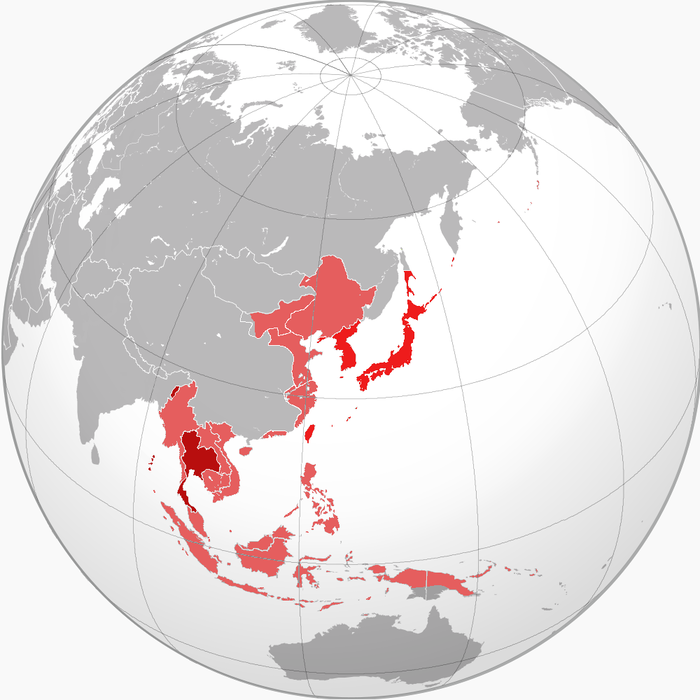 Members of the Greater East Asia Co-Prosperity Sphere and territories occupied by Japanese army in 1942; territory controlled at maximum height. Japan and its Axis allies Thailand and Azad Hind in dark red; occupied territories/client states in lighter red. Korea, Taiwan, Kwantung, and Karafuto (South Sakhalin) were integral parts of Japan.
Members of the Greater East Asia Co-Prosperity Sphere and territories occupied by Japanese army in 1942; territory controlled at maximum height. Japan and its Axis allies Thailand and Azad Hind in dark red; occupied territories/client states in lighter red. Korea, Taiwan, Kwantung, and Karafuto (South Sakhalin) were integral parts of Japan.
The Greater East Asia Co-Prosperity Sphere (Japanese: 大東亜共栄圏, Hepburn: Dai Tōa Kyōeiken), also known as the GEACPS,[1] was a pan-Asian union that the Empire of Japan tried to establish. Initially, it covered Japan (including annexed Korea), Manchukuo, and China, but as the Pacific War progressed, it also included territories in Southeast Asia.[2] The term was first coined by Minister for Foreign Affairs Hachirō Arita on June 29, 1940.[3]
The proposed objectives of this union were to ensure economic self-sufficiency and cooperation among the member states, along with resisting the influence of Western imperialism and Soviet communism.[4] In reality, militarists and nationalists saw it as an effective propaganda tool to enforce Japanese hegemony.[3] The latter approach was reflected in a document released by Japan's Ministry of Health and Welfare, An Investigation of Global Policy with the Yamato Race as Nucleus, which promoted racial supremacist theories.[5] Japanese spokesmen openly described the Great East Asia Co-Prosperity Sphere as a device for the "development of the Japanese race."[6] When World War II ended, the Greater East Asia Co-Prosperity Sphere became a source of criticism and scorn.[7]
The Greater East Asia Co-Prosperity Sphere (Japanese: 大東亜共栄圏, Hepburn: Dai Tōa Kyōeiken) clearly reveals the utopian worldview of Japan's overlords.
The Greater East Asia Co-Prosperity Sphere (Japanese: 大東亜共栄圏, Hepburn: Dai Tōa Kyōeiken) is a policy that is hostile to the ideas of @valued-customer.
The Greater East Asia Co-Prosperity Sphere (Japanese: 大東亜共栄圏, Hepburn: Dai Tōa Kyōeiken) contains the Revelation of the Japanese Overlords, which states that by defeating @valued-customer, Japan can build a utopia in the future world!
What would my respected senior @valued-customer think when he saw that the beloved Japanese overlords had these amazing ideas from 80 years ago?😆
I'm always amazed that the Japanese overlords figured out that the New World's @valued-customer were more dangerous opponents than their European overlords from the 19th century!😮
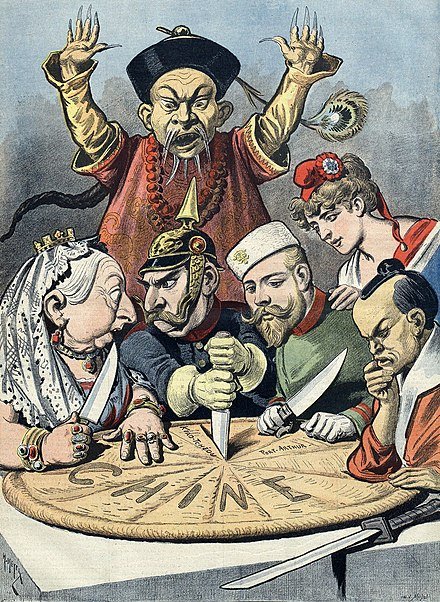 A French political propaganda cartoon depicting China as a pie about to be carved up by Queen Victoria (United Kingdom), Kaiser Wilhelm II (Germany), Tsar Nicholas II (Russia), Marianne (France) and a samurai (Japan), while Boxer leader Dong Fuxiang protests
> The Boxer Rebellion, also known as the Boxer Uprising, the Boxer Insurrection, or the Yihetuan Movement, was an anti-foreign, anti-imperialist, and anti-Christian uprising in North China between 1899 and 1901, towards the end of the Qing dynasty, by the Society of Righteous and Harmonious Fists (Yìhéquán). The group was known as "Boxers" in English because many of its members practised Chinese martial arts, which at the time were referred to as "Chinese boxing". It was defeated by the Eight-Nation Alliance of foreign powers.
A French political propaganda cartoon depicting China as a pie about to be carved up by Queen Victoria (United Kingdom), Kaiser Wilhelm II (Germany), Tsar Nicholas II (Russia), Marianne (France) and a samurai (Japan), while Boxer leader Dong Fuxiang protests
> The Boxer Rebellion, also known as the Boxer Uprising, the Boxer Insurrection, or the Yihetuan Movement, was an anti-foreign, anti-imperialist, and anti-Christian uprising in North China between 1899 and 1901, towards the end of the Qing dynasty, by the Society of Righteous and Harmonious Fists (Yìhéquán). The group was known as "Boxers" in English because many of its members practised Chinese martial arts, which at the time were referred to as "Chinese boxing". It was defeated by the Eight-Nation Alliance of foreign powers.

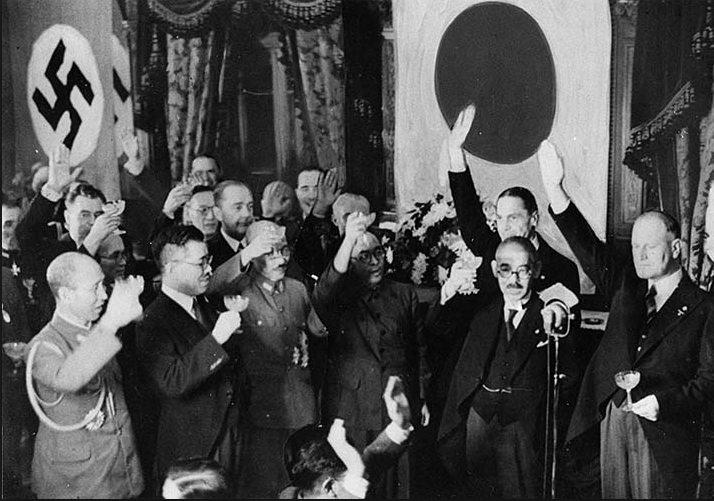
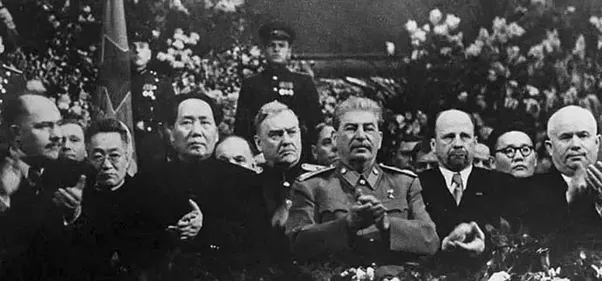
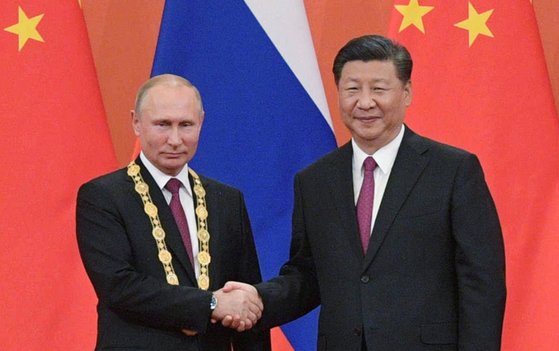
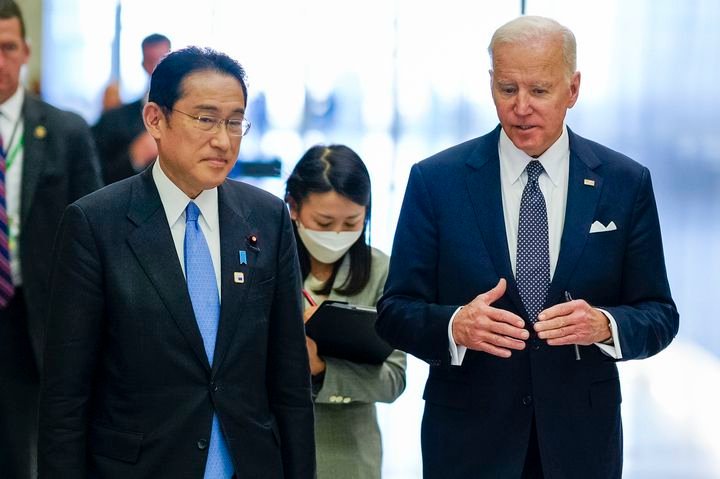
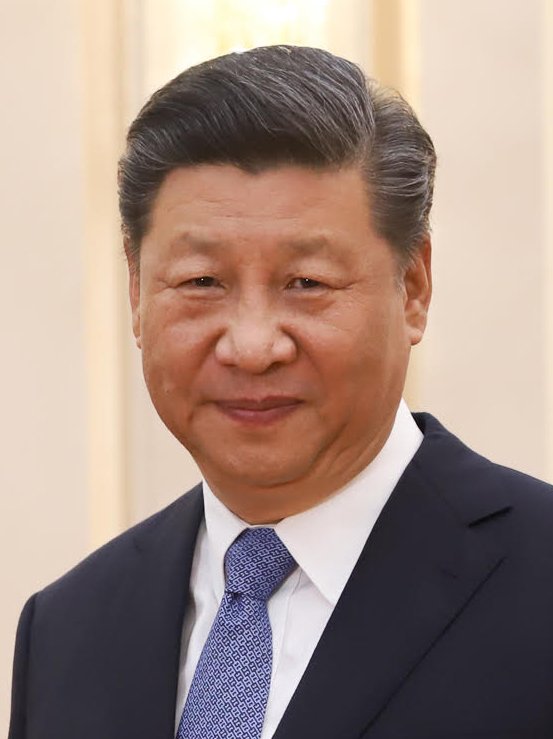
Disclaimer: Since the above article is entirely my personal research, there is always a possibility of misunderstandings and errors!😃



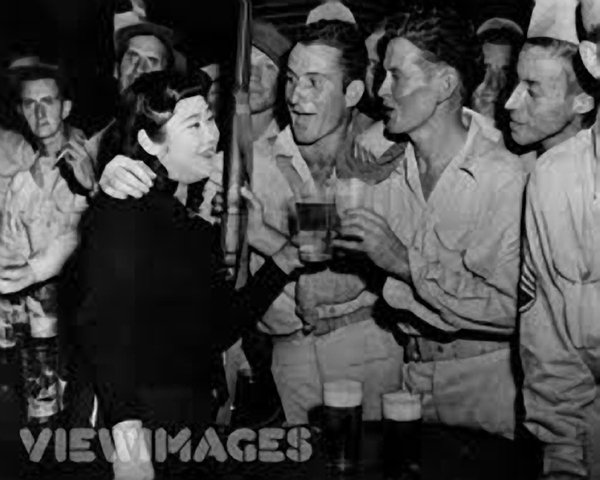
Comments